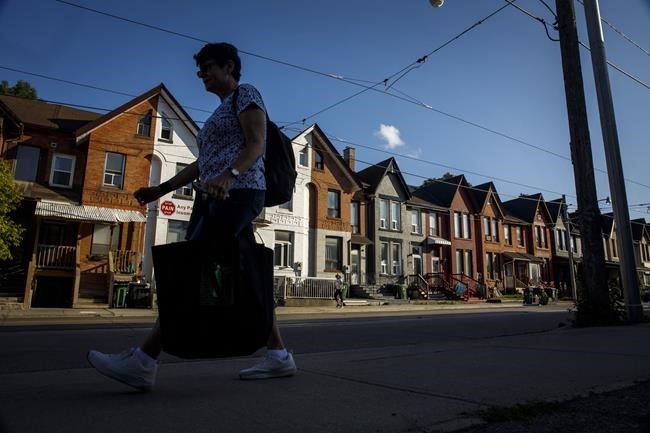Last month, Chelsea Hunt and her husband concluded that the cost of living had skyrocketed to a point where they could no longer afford to stay in their apartment and needed to move.
“We were living paycheque to paycheque,” the 26-year-old said.
“We were having to borrow money from one of our parents at different times. I have two babies under two, so it was just a lot to feed all of us and to make our rent every month.”
The family of four packed up their belongings from their Saint John, N.B. apartment and moved in with Hunt's parents, roughly 30 minutes outside the city.
Despite having to sacrifice their privacy and independence, Hunt described the move as a weight lifted off her and her husband’s shoulders.
She said it’s allowed them to focus on paying off their student loans and car payments since they’re no longer “racking up” their credit cards and paying for groceries, rent and hydro.
Meanwhile, their kids get to spend more time with their grandparents.
Hunt’s story is not unique.
A recent Statistics Canada survey, conducted between Oct. 21 and Dec. 4, 2022, found that more than one-third of Canadians were finding it difficult for their household to meet its financial needs within the previous 12 months.
The survey also found that due to rising prices, 44 per cent of respondents aged 25 to 34 either wanted to purchase a home or move but did not, moved sooner than planned, or chose a more affordable house or rental. For Canadians aged 15 to 24, that figure was 33 per cent.
Before making a move such as downsizing or opting for cohabitation with a loved one or roommate, it’s crucial to reflect and weigh your options and priorities, said Cindy Marques, a certified financial planner and co-founder of MakeCents.
If you prefer to be a city dweller because it makes you happy and feeds your soul, Marques said you’ll have to accept that housing prices are going to “eat up” a larger percentage of your income and you’ll have to cut back in other areas like dining out or shopping in order to save.
But if the cost of living in a big city like Toronto, for example, is too high to bear, then you’ll have to consider moving in with your parents or with a roommate, or moving out of the city altogether to downsize your expenses, said Marques.
“You really do have to consider all the options here,” she said.
Marques strongly encourages those who are choosing to make such moves to be mindful of why they’re doing so in the first place and to keep their sights set on their financial goals.
“If you're downsizing in terms of rent, is it because you're saving up for a down payment? Or maybe you're already an owner and you're downsizing to a cheaper property because you want to expedite your progress to retirement. OK, write that down, crunch the numbers,” she said.
Otherwise, once you've made the change, the extra wiggle room in your wallet might result in your original goals being "lost to lifestyle creep," said Marques.
“Figure out what is it you're saving and what are you saving towards."
Anne Arbour, director of strategic partnerships for the Credit Counselling Society, agreed.
“Have a firm plan and stick to it and hold yourself accountable,” she said.
Arbour recommends that people have a “very clear picture” of their individual finances and budget before deciding to move — disregarding what others in their social circle or age group are doing.
“You should only do what is right for you and your plan and personal situation,” she said.
If you’re planning to move in with loved ones or roommates, she said it’s important to first establish a set of rules and expectations.
“Friends and money or partners and money can bring a whole different level of emotion and stress, so you want to make sure that everybody is on the same page,” said Arbour.
She also noted that there are prices to pay for every move, such as moving costs, land transfer taxes, closing costs and realtor fees, which may add up quickly and cut into your savings. And if you’re moving municipalities, there could be other expenses like higher car insurance premiums, she said.
“It's not just a short-term solution because it costs money to move,” said Arbour.
For Hunt, moving back home has offered an opportunity for her and her husband to get their finances back in order.
“We’re just looking to pay down our bills and then live on our own,” she said.
Ultimately, if your living situation and finances are causing you “undue stress,” Arbour, with the Credit Counselling Society, said you should reach out for help, "whether it's a not-for-profit credit counsellor, a trusted friend, or older adults who can offer some perspective."
“You're not the only one feeling this way — this is really common.”
This report by The Canadian Press was first published March 28, 2023.
Noushin Ziafati, The Canadian Press



